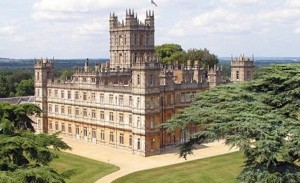
Two images of wealth are currently top-of-mind for much of the U.S. public: One is that embodied by Mitt Romney–a successful and admirable businessman…or a loathsome representative of the parasitical 1%, depending on your point of view. The other is that of the fictional, wealthy, and paternalistic Crawley clan of Britain, protagonists of PBS’s enthusiastically received Masterpiece Theatre series, Downton Abbey.
So the question naturally arises: Would Mitt Romney fit in at Downton Abbey? Should the White House gig not work out, mightn’t he find a suitable situation there?
In one sense, the questions are preposterous. Romney is a very American guy, a fact underscored by even such unusual attributes as his Mormon faith. Although Mitt has ancestors from England—one grandfather hailed from Birmingham and other forebears, from Lancashire—his more pertinent history is strictly Yankee Doodle. For heck’s sake, one great-grandmother was born in a covered wagon during her family’s journey West!
The Crawleys, on the other, hand are the very definition of buttoned-down British aristocracy. Heredity is everything—especially as the series’ main plot turns on an entail, or a restriction on who is next in line to preside over their fabulous landed estate and to inherit the accompanying title of Earl of Grantham. Robert Crawley, a.k.a. the Earl played by actor Hugh Bonneville, would no more know what to do with a balance sheet than with a Fenway Frank.
All the same, Robert and Mitt have a few things in common.
Both are products of dynasties, although Mitt’s is a political one. His father, George Romney, was a three-term governor of Michigan and a 1968 Presidential candidate. Inherited wealth hardly figures, though: Mitt donated the pile he got from George, once CEO of American Motors, to an institute at Brigham Young University. Instead, Mitt’s personal history is all about Harvard Business School, Bain & Co. “growth-share matrices,” and a carnal attitude toward number-crunching. “Pile the budgets on my desk and let me wallow,” he told The New Yorker in 2007. (And you thought Newt Gingrich had unbridled lusts.)
Noblesse oblige is an impulse familiar to both men. The signature achievement of Mitt’s term as Governor of Massachusetts, Romneycare, was inspired by a desire to “do a service to the people,” in the words of the former business ally who encouraged the reform, Staples Inc. founder Thomas Stemberg. At Bain, Mitt was thought to be a very fair and caring manager, one who inspired loyalty and motivation by spreading the takings around.
Bain Capital’s leveraged buyouts did, of course, prompt some firings and loss of jobs. Mitt has even famously admitted that he “likes being able to fire people.” (Yes, yes, he was speaking about canceling his insurance coverage.) This would be a point of contention with the tender-hearted Earl of Grantham, who cannot bear to fire anyone and even suffers remorse when he has an argument with a servant.
But I can easily imagine Mitt energetically sorting out the sprawling and decaying Crawley estate. Those rotting outbuildings would experience the full impact of the Romney paintbrush, powered by the can-do attitude that Mitt exhibited at the 2002 Olympics. And the vast Romney family with its 16 grandchildren could help to fill the doubtlessly underutilized, 60-bedroom Highclere Castle, setting of the Downton Abbey series.
Come to think of it, Mitt has only two houses at the present time, one on New Hampshire’s Lake Winnipesaukee and another fronting on the Pacific Ocean at La Jolla, California. (He also has a pied-à-terre in the Boston area.) For sure, he could use another roof over his head. Two years back, when composer Andrew Lloyd-Webber expressed an interest in buying Highclere Castle, the current Earl said the palace could fetch a selling price of £150 million—doable for Romney, whose net worth was estimated at $250 million several years ago. So let’s get the Romney legal eagles at Patton Boggs LLP to take a close look at that entail thing—maybe, just maybe, the Crawleys could sell the joint after all.
